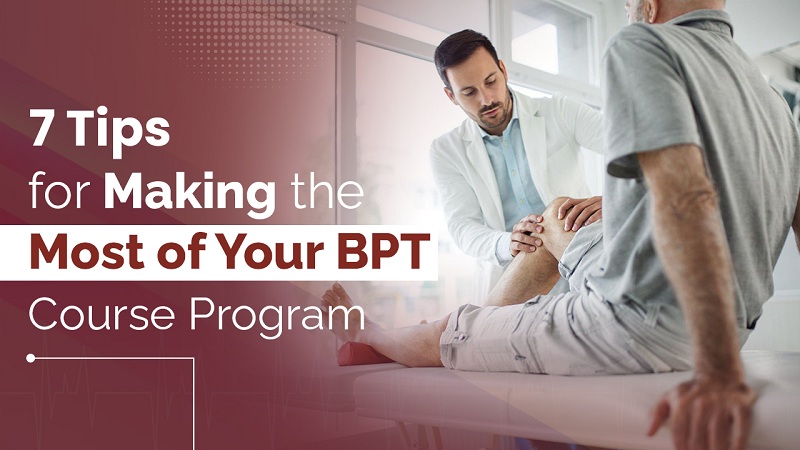If you are a student of Bachelor of Physiotherapy (BPT) or planning to pursue this course, you might be wondering how to make the most of your BPT course program. Physiotherapy is a rewarding and challenging profession that requires a lot of dedication, skills and knowledge.
In this blog, we will share with you seven tips that can help you excel at BPT colleges in Mumbai and prepare you for a successful career as a physiotherapist.
Table of Contents
What is a BPT Course?
BPT stands for Bachelor of Physiotherapy, which is a four-year undergraduate degree program that consists of eight semesters. It aims to equip students with the knowledge and skills to assess, diagnose, treat, and prevent various physical problems and disorders. The course curriculum covers both theoretical and practical aspects of physiotherapy, such as anatomy, physiology, biomechanics, kinesiology, pathology, pharmacology, electrotherapy, exercise therapy, manual therapy, and rehabilitation. Some of the best physiotherapy colleges in Maharashtra also include clinical rotations in their BPT course – in various settings, such as hospitals, clinics, sports centres, schools, and community health centres.
For more information about this course in BPT colleges in Mumbai and other Indian cities, take a look at the table below.
| Course Name | Bachelor of Physiotherapy (BPT) |
| Level | Undergraduate |
| Duration | 4 years + 6 months of rotatory internships |
| Mode of Examination | Semester System |
| Eligibility Criteria | At least 50% marks in 10+2 or equivalent examinations with Physics, Chemistry, Biology, and English |
| Mode of Admission | Entrance Exam/ Merit-based |
| Common Entrance Exams | LPUNEST, NEET, VEE, etc. |
| Average Course Fee | INR 1 – 5 Lakhs |
| Average Salary | INR 5 LPA |
Scope and Career Prospects of the BPT Course
The scope and career prospects of the BPT course from BPT colleges in Mumbai or elsewhere are:
- After completing the BPT course, the graduates can register as licensed physiotherapists with the Indian Association of Physiotherapists (IAP) or any other recognized body.
- They can work as physiotherapists in various sectors, such as hospitals, clinics, rehabilitation centres, sports teams, fitness centres, wellness centres, corporate sectors, educational institutions like BPT colleges in Navi Mumbai, research organisations, and NGOs.
- Graduates can also pursue higher studies in physiotherapy, such as a Master of Physiotherapy (MPT), Doctor of Physiotherapy (DPT), or PhD in Physiotherapy.
- Students can also opt for specialisation in various branches of physiotherapy at Terna Physiotherapy College, such as orthopaedics, neurology, cardiology, respiratory
7 Tips to Make the Most of Your BPT Course
1. Choose the right college and curriculum
The quality of your education depends largely on the college and the curriculum you choose. Make sure you do your research and select a college that is recognised by the Indian Association of Physiotherapists (IAP) and offers a comprehensive and updated curriculum that covers both theoretical and practical aspects of physiotherapy. Also, look for BPT colleges in Mumbai that have tie-ups with reputed hospitals and clinics for internship and placement opportunities.
2. Develop your clinical skills and experience
One of the most important aspects of your BPT course program is the clinical training that you receive. Take every opportunity to learn from your mentors, seniors and peers at Bachelor of Physiotherapy colleges in Mumbai and practice your skills in different settings and scenarios. You should also seek feedback and guidance from your teachers and supervisors and work on improving your weak areas. Clinical skills and experience are essential for building your confidence and competence as a physiotherapist.
3. Keep yourself updated with the latest trends and developments
Physiotherapy is a dynamic and evolving field that requires you to keep yourself updated with the latest trends and developments in the profession. You should read journals, books, blogs, newsletters and magazines related to physiotherapy and attend seminars, workshops, conferences and webinars whenever possible. Also, join professional associations and networks and interact with other physiotherapists to exchange ideas, insights and experiences at BPT colleges in Mumbai.
4. Enhance your communication and interpersonal skills
As a physiotherapist, you will have to communicate effectively with your patients, their families, other health professionals and society at large. You will have to explain complex medical terms, procedures and outcomes in simple language, listen empathetically to your patient’s concerns and expectations, motivate them to adhere to their treatment plans, educate them about preventive measures and lifestyle modifications, and advocate for their rights and welfare. You will also have to work in teams with other health professionals and coordinate care for your patients. Therefore, you should enhance your communication and interpersonal skills by participating in debates, presentations, group discussions, role plays and other activities at BPT colleges in Mumbai.
5. Take care of your physical and mental health
Physiotherapy is a physically demanding and emotionally draining profession that can take a toll on your health if you are not careful. You will have to deal with patients who are in pain, distress or disability, handle heavy equipment and machines, perform manual therapy techniques, work long hours and cope with stress and pressure. Therefore, take care of your physical and mental health by following a balanced diet, exercising regularly, getting enough sleep, practising relaxation techniques, pursuing hobbies and interests, seeking social support and seeking professional help if needed.
6. Prepare for further studies or specialisation
If you want to advance your career as a physiotherapist, you should consider pursuing further studies or specialisation after completing your BPT course program. You can opt for a Master of Physiotherapy (MPT) or a Doctor of Physiotherapy (DPT) degree in various fields such as orthopaedics, neurology, sports, paediatrics, geriatrics, cardiorespiratory, women’s health etc. at physiotherapy colleges in Navi Mumbai and elsewhere. Another option is to pursue short-term courses or certifications in areas such as manual therapy, acupuncture, dry needling, yoga etc. Further studies or specialization can help you gain more knowledge, skills and recognition in the profession.
7. Be passionate about your profession
Last but not least, you should be passionate about your profession as a physiotherapist. Be proud of your role as a healer who helps people recover from injuries, illnesses or disabilities and improve their quality of life. Try to stay committed to lifelong learning and professional development and strive to be ethical, responsible and compassionate in your practice.
Also Read: 7 Facts You Should Be Aware of Before Studying MBBS or MD
Conclusion
These are some of the tips that can help you make the most of your BPT course program. By following these tips, you can not only excel in your academics at BPT colleges in Mumbai and other parts of India but also prepare yourself for a rewarding career as a physiotherapist.
FAQs
- What is the other name for orthopaedic physiotherapy?
Some of the most common jobs that you can opt for after BPT are those of physiotherapist, osteopath, sports physio rehabilitator, researcher, and lecturer.
- What is the other name for orthopaedic physiotherapy?
Orthopaedic physiotherapy is also known as Musculoskeletal physiotherapy.
- What is taught in a BPT course?
Basic Principles Of Biomechanics, Foundation Of Exercise Therapy & Soft Tissue Manipulation, Electrotherapy, Clinical Orthopaedics & Traumatology, Physiotherapy In Cardiovascular, Pulmonary & Intensive Care are just some of the topics taught in a BPT course.
- Is there a demand for physiotherapists?
Yes, there is high demand for physiotherapists in India, which falls short of WHO standards by almost 90000+ physiotherapists.




